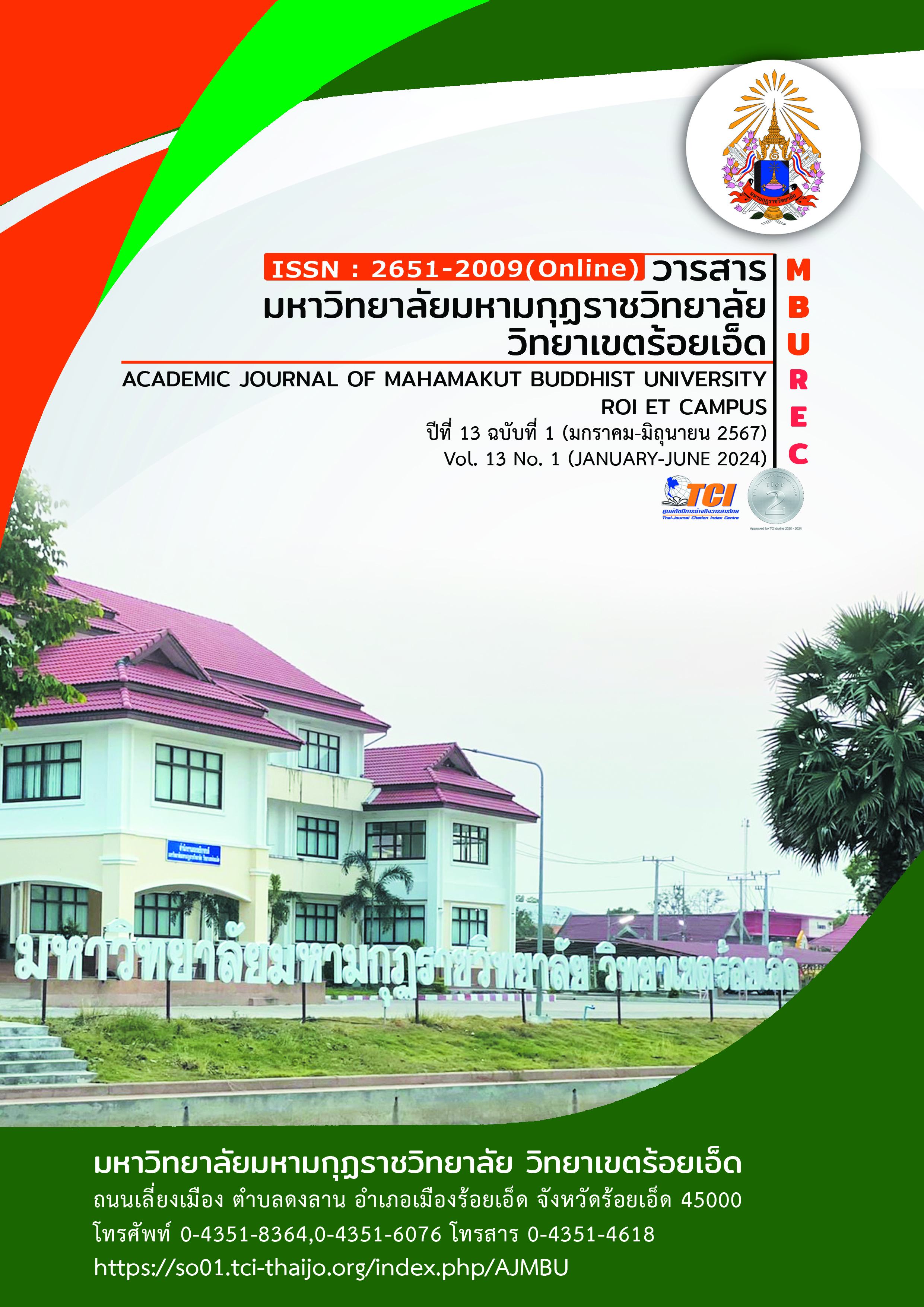AN APPLICATIVE GUIDELINE OF THE PRINCIPLE OF FOUR VIRTUES FOR GOOD HOUSEHOLD LIFE TO SOLVE THE CONFLICT PROBLEMS IN BAN CHIENGPANG COMMUNITY, AN KWANG SUBDISTRICT, MAUNG DISTRICT, UDONTHANI PROVINCE
Main Article Content
Abstract
The objectives of this research are 1) to study the 4 principles of Secular Dharma in Buddhism, 2) to study the current state of conflict in the Ban Chiang Phang community, Na Kwang Subdistrict, Mueang District, Udon Thani Province, and 3) to propose guidelines for using the 4 principles of Secular Dhamma to Solve conflict problems in the Ban Chiang Phang community, Na Kwang Subdistrict, Mueang District, Udon Thani Province The sample group used in the research included 25 monks and community leaders. The research tools included interviews. Descriptive data analysis was analyzed.
The results of the research found that 1. the 4 principles of Secular Dhamma in Buddhism consist of 1) The principles of truth, which are truth, honesty, honesty, sincerity, speaking the truth, doing the truth. 2) Dhamma, which is training, restraint, training habits, adapting, knowing how to control the mind Practicing personality modification Bug fixes improve you resell to progress with wisdom. Self-awareness being aware of changes 2. Family conflict there are many issues. Because of the people in the area there are a variety of beliefs, religions, ideas, and ages, but there is a desire for happiness. So, we had to find different places to rely on. A group that understands the current picture of changes in many aspects, such as income generation, technology, globalization, various online worlds, news, etc. 3) Be truthful and be respected by others. Because he is sincere, keeps his word, does not waver, because a person who adheres to the truth will be able to perform his duties effectively and in time and be successful. Meetama makes people live together happily with others in society. They do not easily quarrel with each other and know how to avoid.
Article Details

This work is licensed under a Creative Commons Attribution-NonCommercial-NoDerivatives 4.0 International License.
References
ประมวล รุจนเสรี. (2541). นายอำเภอในฝัน. กรุงเทพมหานคร : มติชน.
พระเทพเวที (ประยุทธ์ ปยุตฺโต). (2532). เทคนิคการสอนของพระพุทธเจ้า. กรุงเทพมหานคร : โรงพิมพ์มหาจุฬาลงกรณราชวิทยาลัย.
พระมหาอภิสิทธิ์ อภิภทฺรเมธี (ไทยธานี). (2564). การบริหารงานบุคคลตามหลักฆราวาสธรรม 4 ของผู้บริหารโรงเรียนพระปริยัติธรรม แผนกสามัญศึกษา จังหวัดขอนแก่น. Journal of Modern Learning Development. 6(1). 278-378.
พระสมชาย เตชปญฺโญ (เตชะ). (2560). การบริหารงานวิชาการตามหลักฆราวาสธรรม 4 ของผู้บริหารโรงเรียนมัธยมศึกษา อำเภอวังน้อย จังหวัดพระนครศรีอยุธยา. วิทยานิพนธ์ พุทธศาสตรมหาบัณฑิต สาขาวิชาพระพุทธศาสนา. บัณฑิตวิทยาลัย : มหาวิทยาลัย มหาจุฬาลงกรณราชวิทยาลัย.
วีรวรรณ ธานี. (2548). การบริหารความขัดแย้งในองค์การ. กรุงเทพมหานคร : มหาวิทยาลัยเทคโนโลยีราชมงคลตะวันออก วิทยาเขตท่าพระ.
สมเด็จพระมหาวีรวงศ์ (พิมพ์ ธมฺมธโร). (2539). มงคลยอดชีวิตฉบับสมบูรณ์. กรุงเทพมหานคร : ธรรมสภา.
สมเด็จพระมหาสมณเจ้ากรม พระยาวชิรญาณวโรรส. (2535). พุทธศาสนสุภาษิต เล่ม 1. พิมพ์ครั้งที่ 2. กรุงเทพมหานคร : โรงพิมพ์เลี่ยงเชียง.


